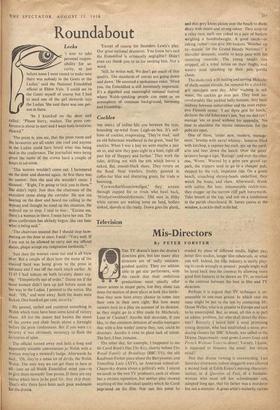Roundabout
Leeks
`So I knocked on the door and called : "Please hurry, madam. The press con- ference is about to start and I want both lavatories cleared."
'The point is, you see, that the press room and the lavatories are all under one roof and anyone in the Ladies could have heard what was being said in the conference. The journalists were being given the name of the crown bard a couple of hours in advance.
'This woman wouldn't come out. I hammered on the door and shouted again. At first there was no answer; then she said she wouldn't come. I shouted : "Right, I'm going to lock you in there." She didn't reply. Just then the chairman of the executive came along the corridor. He saw me beating on the door and heard me calling to the Woman and thought he sized up the situation. He ordered me to stop. I said to him : "Excuse me, there's a woman in there. I must have her out. The Press conference has already begun. She can hear what is being said."
'The chairman insisted that I should stop ham- mering on the door at once. I said: "Very well. If I am not to be allowed to carry out my official duties, please accept my resignation forthwith."
'Just then the woman came out and it all blew over. But a couple of days later the name of the chaired bard was being given to the press in advance and I was off the mark much earlier. At 11.45 I had notices on both lavatory doors say- ing: "Temporarily out of order." Damn me if the same woman didn't turn up just before noon on her way to the Ladies. I pointed to the notice. She said "Oh," and went away. Both the doors were locked. One hundred per cent. security.'
He paused, smiled and muttered something in Welsh which must have been some kind of victory chant. All but the insane had known the name of the crown and chair bards about a fortnight before the press conferences. But if you were i/c security it was obviously necessary to flush the lavatories of spies.
The official turned away and held a long and apparently amiable conversation in Welsh with a woman wearing a steward's badge. Afterwards he said : 'Oh, they're a mean lot of devils, the Welsh Welsh. The only way we can get them in here at all—into an all-Welsh Eisteddfod mind you—is to give them stewards' free passes. If there are any extras which have to be paid for, they skip them. That's why there have been such poor audiences for the drama. `Except of course for Saunders Lewis's play. Our great national dramatist. You know he's said the Eisteddfod is artistically negligible? Didn't .even say thank you to us for inviting him. Not a word.
'Still, he writes well. We don't get much'of that quality. The standards of entries are going down and down.' He assumed a spokesman voice. 'Mind you, the Eisteddfod is still immensely important. It's a dignified and meaningful national festival where Welsh-speaking people can meet in an atmosphere of common background, harmony and friendship.'
Cockles
THE SMELL of iodine hits you between the eyes, bounding up-wind from Leigh-on-Sea. It's mil- lions of cockles, evaporating. 'They're mad,' said an old fisherman weathered in the grain, 'mad for cockles. When I was a boy we went maybe a pair on us, and now they goes eight to a boat, right off past Isle of Sheppey and farther.' They work the tides, drifting out with the ebb which leaves a naked, flat, mussel-black shore. They return on the flood. Neat trawlers, freshly painted in coffee-bar blue and shattering green, for trade is booming.
'CorwotcherbIoorninwellgot; they scream through cupped fist to rivals who bawl back, 'M indyerownbloodybizmate.' Old, men in filthy white aprons are waiting tense on land, boilers stoked, shovels at the ready. Down goes the plank, and thin grey knees piston over the beach to sheds dizzy with steam and strong odour. They keep up a relay race, each one yoked to a pair of baskets weighing a hundredweight. A good catch—or raking, rather—can give 300 baskets. 'Wotcher up to—trainin' fer the Grand bloody National?' a shoveller demands, unable to keep pace with his cantering comrade. The young toughs run stripped, oil a tribal tattoo on their thighs, and watery mud splashing up their pale gorilla chests.
The sheds rock with boiling and sieving. Hillocks of shells mount outside, for removal by a chicken- grit merchant next day. After washing in salt water, the cockles go into jars. They look un- comfortably like pickled belly-buttons; they taste midway between indiarubber and the most expen- sive Flemish oyster. eat three pint fer lunch,' declares the old fisherman's son, 'but me dad can't manage 'em so good without. his appendix.' No time to elucidate the mystic connection, for the pubs are open.
One of them, 'under new, modern, manage- ment,' bristles with naval whimsy : lanterns filled with ketchup, a capstan hat-rack, gin up the yard- arm and beer down the hatch. Over the gents' lavatory hangs a sign, 'Ratings': and over the other one, 'Wrens.' Warned by a grim new gravel car park, the trippers tend to go to a cheaper pub, slapped by the rich, impatient tide. On a green bench, crunching shrimp-heads underfoot, they watch the boats, and chew. Afterwards, drunk with iodine, .flat beer, innumerable cockle-teas, they stagger up the narrow cliff path homewards. Take breath at the top, and rest on a tombstone in the parish churchyard. St. James yawns at the window, a cockle-shell in his hat.






























 Previous page
Previous page